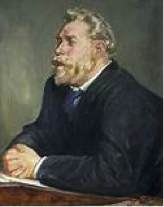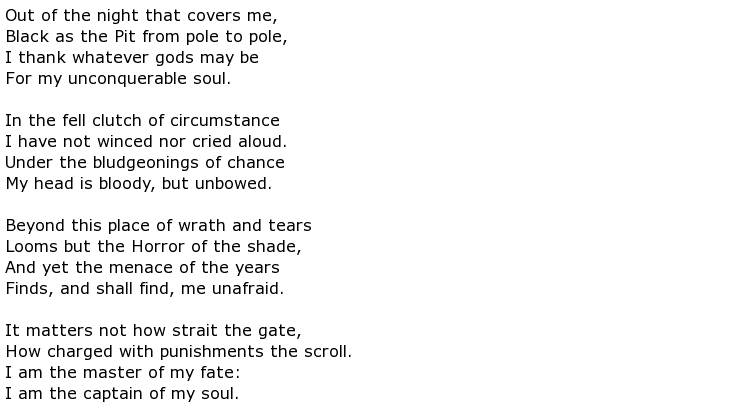 Although William Ernest Henley was a poet he was, in truth, better known as an editor and critic. He was, in fact, unknown as a poet until his 36th year and confessed himself “unmarketable” as a poet prior to 1887. Whether his generally poor health from boyhood up to then had anything to do with it is uncertain, but there is no doubt that he was inspired to write from a very young age.
Although William Ernest Henley was a poet he was, in truth, better known as an editor and critic. He was, in fact, unknown as a poet until his 36th year and confessed himself “unmarketable” as a poet prior to 1887. Whether his generally poor health from boyhood up to then had anything to do with it is uncertain, but there is no doubt that he was inspired to write from a very young age.
He was born in the city of Gloucester in August 1849 into a large family of six children. He was the eldest and at 12 years of age he found himself at The Crypt School where he was fortunate to find himself under the influence of the distinguished academic T E Brown who had been appointed as head master. Brown loaned books to his young charge, thus instilling in him a long-lasting appreciation for literature. The two became close friends and Henley considered Brown to be nothing less than a literary genius.
It was at this time that Henley’s health began to suffer when he was diagnosed with tuberculosis of the bone and the only remedy to prevent a spread of this disease was amputation of his left leg below the knee. This was a shocking situation for a young boy but he somehow survived it and passed his final examinations. There was no university place for him though and he moved to London in 1867 to take up a career in journalism. He soon found his right leg also diseased, resulting in frequent spells in hospital. He wrote a collection of poems called In Hospital covering a stay at the Royal Infirmary in Edinburgh between 1873 and 1875.
It was thought that he might lose his other leg but he managed some kind of recovery and lived a reasonably active life for almost 30 more years. His 3 years in Edinburgh brought him into contact with the writer Robert Louis Stevenson and the two struck up a lasting friendship. Stevenson wrote to his friend after his famous book Treasure Island had been published admitting that he had based the character Long John Silver on his friend Henley – both having an amputated leg to contend with. Stevenson wrote:

One of Henley’s best known poems came out of this period. Invictus is a cry from the heart, demonstrating that his troubles would not overcome him, no matter how much worse things might get. Here is the poem:

The editor of Cornhill Magazine took Henley’s poems as he wrote them in hospital for publication in the magazine. This seemed to inspire Henley to go to London once he was well enough and he began his editorial career with a publication called London. Although it was a literary review of sorts it seems that it was written more for the writers than for anyone who cared to read it. He spent a good ten years or so in this kind of field before finally achieving some recognition as a poet himself. Some of the work he had written in hospital was read by other editors and publishers and a collection called A Book of Verse came out in 1888 though this did not launch his career as a prolific poet. Instead he went back to journalism, taking up a post as literary editor in Edinburgh a year later.
His old childhood affliction tuberculosis caught up with him once more and William Ernest Henley died at his home in Woking, Surrey in July 1903, just before his 54th birthday.

